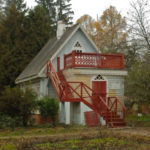And Then, Melikhovo
I began to despair of seeing Anton Chekhov’s country house because its administrators suddenly announced that on my appointed day they were closing for spring-cleaning. But there was a quick shake-up of my itinerary and off I set, wedged between two Sumo-sized Russians in steaming raincoats for the fifty minute train ride to Chekhov. I wonder what he’d think about having a town named after him?
There’s nothing grandiose about Melikhovo. 
The house is a modest size, particularly considering the comings and goings of family members and friends. You can quite understand why Chekhov had the pretty, powder blue, three-room Chaika retreat built. A shed of one’s own. Though it’s situated so close to the main house I imagine he could hear everything that was going on over there.
He only lived at Melikhovo, on and off, for seven years, until his worsening health persuaded him to move south, but the house/estate/museum speaks eloquently of the man. He loved to fish, so he created a pond. He loved to garden so he planted and planted. The descendants of his apple and cherry trees are still there. He loved his dachshunds, named after Quinine and Bromide but also given patronymics, Russian-style – Khina Markovna and Brom Isaevich – and their little statues are in the grounds, guarding their master’s upturned hat. 
What else can we say about him? Was he impatient and testy? Plagued with self-doubt? Big-hearted or cold-hearted? Obsessive, funny, highly-sexed, restless, commitment-shy? All of the above, probably.
He was a doctor, willing at all times to be called away from writing in order to treat a patient: his medicine boxes are there in the house. The table is set for dinner, but his preferred chair is the one nearest the door, for an easy getaway. Parents, sister, endless guests and not always welcome ones. At times the company must have been stifling. I have this seating information, by the way, from my excellent English-speaking guide. If you go to Melikhovo, ask for Mikhail Golovan.
Maybe you know the story of Chekhov’s death. The airless hotel room in the German spa resort of Badenweiler, in the middle of a heatwave. A doctor sent for, late at night. The glass of champagne downed, and then…. I always thought, ‘how very civilised’. But as Mr Golovan explained, in those days offering champagne was a kind of death-bed courtesy between doctors, an unspoken signal that there was nothing more to be done and the end was very nigh.
And then of course there was the undignified removal of the body from the hotel using a laundry basket rather than a coffin, to avoid distressing the other guests. I think that’s a scene Chekhov would have enjoyed very much indeed.

Chekhov has long been a favorite. No wonder I like your writing, Laurie – we are inspired by the same people. Didn’t know the laundry basket story but you’re so right – a truly Chekhovian end.
It all sounds so very interesting and makes me wish I could tackle a trip like this. And I really admire you – setting out so intrepidly on your own. Looking forward to the next instalment. Had you thought of becoming a travel writer or doing a TV travel programme? How wonderful to be able to listen to you instead of those over-excited and self- absorbed presenters we seem to see and hear so much now!